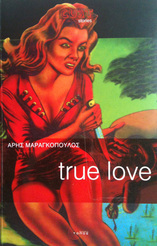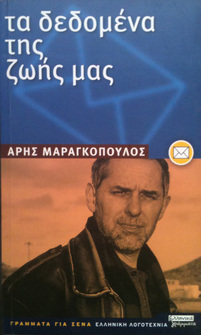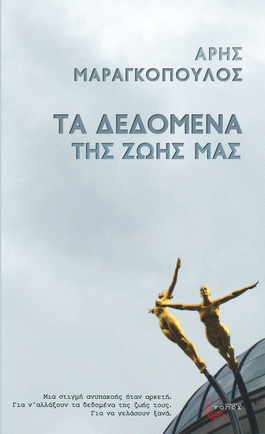Novella II: True Love, 2008

'True Love', cover
True Love is a cruel game of love liaisons in the era of the social web. There' s a similar in concept story but in the distant past: the epistolary novel of 1782 Dangerous Liaisons (by the French libertine writer Pierre Choderlos de Laclos). A.M.'s story is a contemporary satire of nowadays erotic morals, with most characters in the middle of existential crisis. Mimis, a novelist, his companion Sofia, a business woman working in advertisement, Kiki her close friend, Dina, a graphic designer, Stelios, Mimis ’s close friend, Daisy, a simpleton hairdresser, and police officer Porfiris all these players clash to each other in a game of love and power, showing no mercy to nobody, because they all lack the same precious thing – which they vainly try to find in the wrong places.
True Love is the story of unfulfilled love from men ’s point of view. It is the longing for a strong relationship from women ’s point of view. It is also the desperate quest for the Meaning of Life, in and out of a couple’s life: The long ago perished dreams of May ’68.
The theme of True Love sounds like a romance story. But it’s not. Its romanticism is subversive and the known conventions of the genre can only be read as completely farcical.
True Love is essentially a dark comedy that mocks all those who tend to forget that the mind is not the best counselor in matters of heart· a fact that befits some intellectuals who, even if they have devoted their life to the quest for Meaning, they ignore the possibility that this may literally be, if not within them, at least near by.
To get a better idea for this novella the author has prepared a lengthy summary of it, and what is more, in the interesting form of a short story –with whole pages from the original having been transferred intact to the short story. Download the story and enjoy!
True Love is the story of unfulfilled love from men ’s point of view. It is the longing for a strong relationship from women ’s point of view. It is also the desperate quest for the Meaning of Life, in and out of a couple’s life: The long ago perished dreams of May ’68.
The theme of True Love sounds like a romance story. But it’s not. Its romanticism is subversive and the known conventions of the genre can only be read as completely farcical.
True Love is essentially a dark comedy that mocks all those who tend to forget that the mind is not the best counselor in matters of heart· a fact that befits some intellectuals who, even if they have devoted their life to the quest for Meaning, they ignore the possibility that this may literally be, if not within them, at least near by.
To get a better idea for this novella the author has prepared a lengthy summary of it, and what is more, in the interesting form of a short story –with whole pages from the original having been transferred intact to the short story. Download the story and enjoy!
| true love.pdf | |
| File Size: | 191 kb |
| File Type: | |
A teaser video for True Love and a live reading of it
|
|
|
Novella I: The Facts of our Lives, A' 2002, B' 2015
A moment of disobedience meant something.
As if the possibility of changing the facts of their lives really existed.
As if it was possible to laugh again.
As if the possibility of changing the facts of their lives really existed.
As if it was possible to laugh again.
|
This is a genre which A.M. worked at for the first time during a period of professional stress and political distress! To describe in literature these anxieties he needed something short in extent, accessible to a broader public and politically meaningful.
The first novella,The Facts of our Lives, is of the epistolary kind. Two old guys, in pension, feel that the shortening of their physical life should not signify a shortening of their active involvement in social life – moreover when this globalized life has been cheapened in every meaning of the word. So these old friends decide to proceed to a peculiar sort of activism: terrorize those people in power who are directly responsible of terrorizing other citizens' life. And they do it in their simple yet straight way: they present themselves as members of an underground movement and under this disguise they send threatening letters to a number of well known corrupt people of the state. With these letters they urge their targets to do certain things as a work of penance for their former evil deeds. To appear more convincing they move on to small acts of symbolic value: they burn a luxury car, they threaten to disclose secrets of their victims' intimate life to the public, they pretend they know more about the scandals these people are involved etc. Today large social groups throughout the world earn their living in ways which in the past would have been considered criminal, immoral or inhuman. Never before have such large parts of the population been ready to sell anything and everything: the environment, their country, their cultural heritage, their ethics, their aesthetics, their values, their daughter, their knowledge and, above all, their hopes for a more human world. Never before has political corruption been perpetuated so easily by the relaxed reaction of a large section of the population. |
Never before has the American Dream achieved such widespread dominance as a universal human value. Never before was profit a more persuasive accomplice of tolerance and acquiescence on the part of the citizen. Never before was the citizen’s conscience so lonely when set against the fierce competition of profit.
And yet… All it takes to change the world is a single moment of refusal to obey these facts of our lives. The probability that “one day the dreams will have their revenge” is the wager made by the characters in this book, as they live stealthily between the barbarism of the world as it exists and the dreams of the disobedient citizen. The Facts of our Lives is a manifesto against global and national state corruption, a convincing story of companionship, tender love, understanding of the rising power of small urban communities and, above all, a story of firm resistance to today's barbarity – all that written as early as 2002. |
Short stories: Sweet Come Back, 2003

Sweet Come Back was published in 2003. It is the third collection of such stories since Psycho-brothel and This is no Cinema, baby! which both had appeared twenty years ago. This collection is composed of stories that were for the first time published in literary magazines, and are all structured around the same leitmotif: heroes who arduously desire a more truthful, more fulfilled life and as they struggle to that end they become queer exceptions to the vanity of everyday life. Their behaviour contradicts the 'civilised' society rules, since these people believe with religious faith in a secret vision, very personal, almost apocryphal, – which has no meaning to other people.
There's a story of myths and traditions that starts in ancient Greece, another with clones living in a biosphere in the year 2020 Α.D. and stories of strange miracles and love that read everyday life through the reflection of a deforming mirror. All are infused with a tender metaphysical aroma as if reality becomes less real if you believe it to be so – and this is what the heroes in Sweet Come Back seem to firmly believe since they are acting accordingly. From this collection you may download here a complete story, Nostalgic Clone.
There's a story of myths and traditions that starts in ancient Greece, another with clones living in a biosphere in the year 2020 Α.D. and stories of strange miracles and love that read everyday life through the reflection of a deforming mirror. All are infused with a tender metaphysical aroma as if reality becomes less real if you believe it to be so – and this is what the heroes in Sweet Come Back seem to firmly believe since they are acting accordingly. From this collection you may download here a complete story, Nostalgic Clone.
| nostalgic_clone.pdf | |
| File Size: | 156 kb |
| File Type: | |


